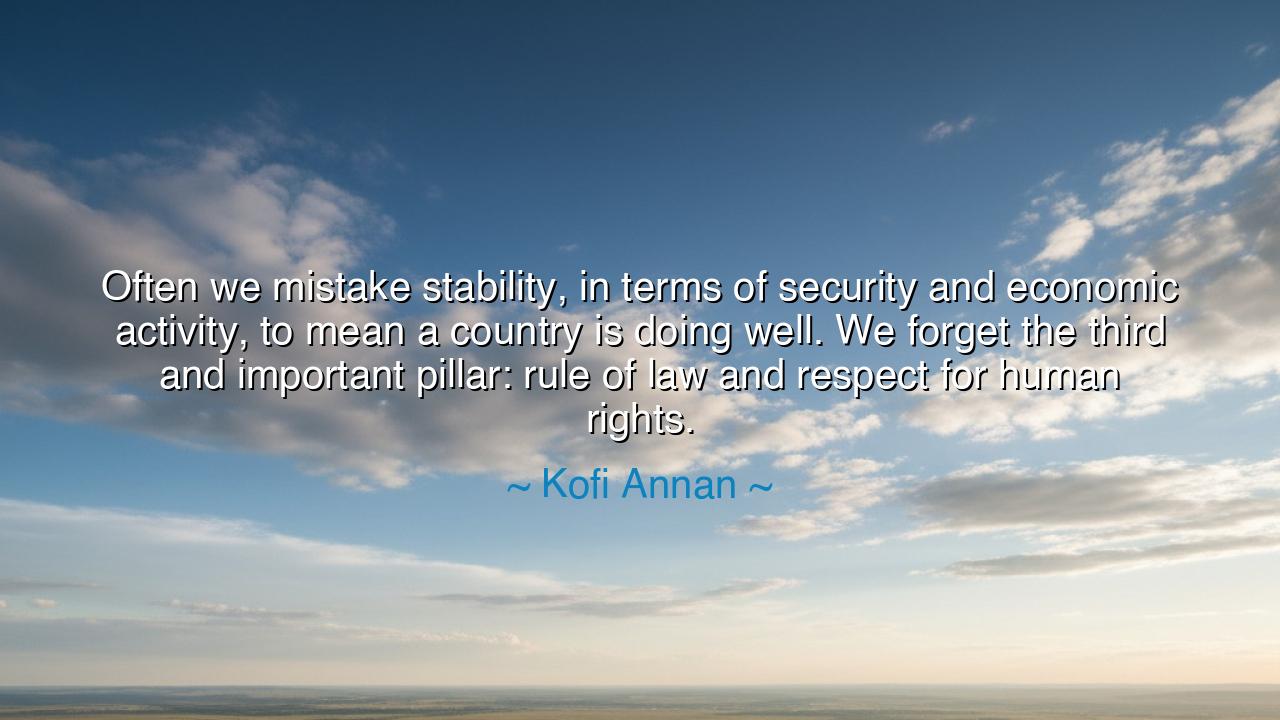
Often we mistake stability, in terms of security and economic
Often we mistake stability, in terms of security and economic activity, to mean a country is doing well. We forget the third and important pillar: rule of law and respect for human rights.






Hear, O children of justice and truth, the words of Kofi Annan, the servant of nations and guardian of peace, who declared: “Often we mistake stability, in terms of security and economic activity, to mean a country is doing well. We forget the third and important pillar: rule of law and respect for human rights.” In this saying lies the wisdom of one who saw the councils of kings and the cries of the oppressed, who knew that gold and armies cannot alone sustain a people. For a nation without law and without human rights is like a house with a grand roof but no foundation: splendid for a moment, yet doomed to collapse.
The origin of this wisdom flows from Annan’s years as Secretary-General of the United Nations, where he bore witness to the rise and fall of nations. He saw how governments boasted of prosperity and military strength, yet beneath their banners, their people wept under oppression. He saw too how rulers declared “stability” while silencing voices, imprisoning dissent, and trampling dignity. Annan, with the vision of a statesman, proclaimed that true greatness is not measured only by wealth or order, but by the rule of law and the respect for human rights that give every citizen their due.
Consider the fate of the Soviet Union. For decades it appeared mighty—its armies vast, its industries strong, its people seemingly secure under the shadow of order. Yet beneath that facade lay a structure hollowed by injustice, where voices were silenced and freedoms denied. When the burden of repression grew too great, the empire collapsed, not from poverty alone, but from the absence of trust, law, and freedom. Annan’s words echo here: a nation without justice may seem stable, but it carries the seeds of its own ruin.
Likewise, history offers the example of South Africa under apartheid. There was economic activity, there was military control, there was order of a kind—but there was no respect for human rights. The nation prospered outwardly but rotted inwardly, until the cries of the oppressed shook the foundations of power. Only when law and justice, guided by Nelson Mandela and others, were restored did the nation take its first steps toward true health. This is the wisdom Annan sought to pass down: that wealth without justice is fragile, and security without dignity is false.
His teaching is also a warning to the present age. Many nations today proclaim strength because their markets flourish and their borders are secure. But if their prisons overflow with the innocent, if their courts bow to the powerful, if their people live in fear of speaking truth—then their “stability” is but a mask, thin as paper. True prosperity rests on three pillars, as Annan declared: security, economic activity, and above all, rule of law with respect for human rights. Remove one, and the others will fall.
O children of tomorrow, learn from this counsel: do not be dazzled by the glitter of wealth or the might of armies. Look deeper, and ask whether a people live in dignity. Ask whether their laws are just, whether their voices are free, whether their humanity is honored. Only then can you know if a nation truly prospers. For the mark of greatness is not how much power a state holds, but how it treats the least of its citizens.
Practically, this means you must act with vigilance and courage. When leaders boast of prosperity, demand also justice. When rulers promise security, demand also freedom. In your own communities, stand for fairness, defend the weak, and uphold truth, for these are the seeds of lasting stability. If you forget them, wealth will vanish and order will crumble; if you remember them, nations will stand firm through the ages.
Thus Kofi Annan’s words shine as a torch across time: “Stability is not enough—without rule of law and respect for human rights, no nation can endure.” Let this truth guide your hearts, that you may build not only strong nations, but just ones, not only rich societies, but noble ones. For in the end, justice is the breath of nations, and without it, all else withers into dust.






AAdministratorAdministrator
Welcome, honored guests. Please leave a comment, we will respond soon